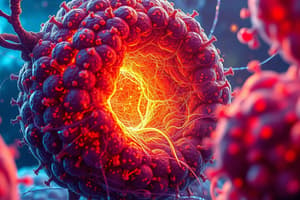Podcast
Questions and Answers
Which organelle contains the activities of the cell?
Which organelle contains the activities of the cell?
Nucleus
What is the function of mitochondria in the cell?
What is the function of mitochondria in the cell?
Aerobic Respiration
What is the role of ribosomes in the cell?
What is the role of ribosomes in the cell?
Protein Synthesis
Study Notes
Cells
- Cells are the smallest unit of life, and all organisms are made up of one or more cells.
- Organisms can be classified as multicellular or unicellular, with unicellular organisms including bacteria and yeast.
- All cells are formed from pre-existing cells, and new cells are produced through cell division.
Microscopes
- Light microscopes can magnify objects up to 1500 times.
- Electron microscopes can magnify objects up to 500,000 times.
Cell Parts
- Every cell has a cell membrane, which is partially permeable.
- Cell walls are thin layers of protein and fat found in plant cells, and are composed of cellulose.
- Cytoplasm controls what enters and leaves the cell.
- Vacuoles contain cell sap, which includes sugars.
Other Cell Parts
- The nucleus contains the cell's genetic material.
- Chloroplasts are found in plant cells and are responsible for photosynthesis.
- Mitochondria are responsible for aerobic respiration.
- Ribosomes are responsible for protein synthesis.
Cell Functions
- The nucleus controls the cell's activities.
- Chloroplasts are involved in photosynthesis in plant cells.
- Mitochondria perform aerobic respiration.
- Ribosomes are responsible for protein synthesis.
- Cell walls, found only in plant cells, contain cellulose and are fully permeable.
Studying That Suits You
Use AI to generate personalized quizzes and flashcards to suit your learning preferences.
Description
Learn about the basic structure and function of cells, including cell membranes, cell walls, and the different types of cells. Understand how cells divide and multiply to form new cells.




